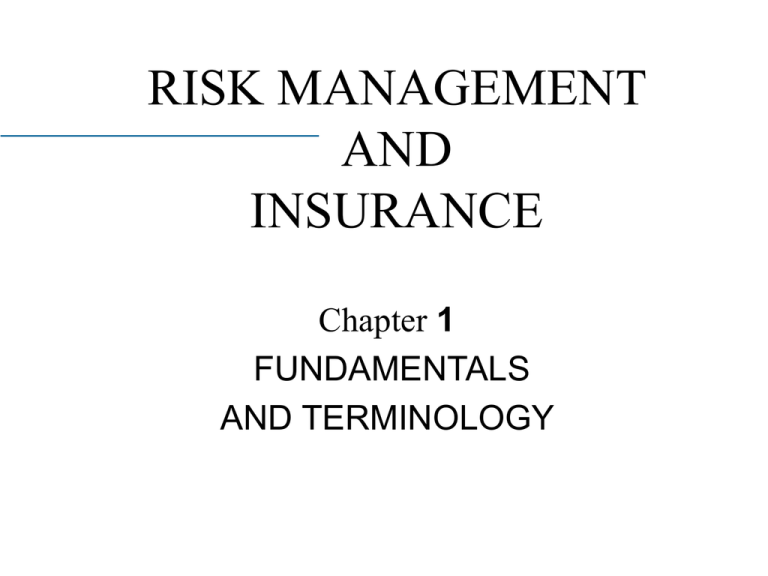
RISK MANAGEMENT
AND
INSURANCE
Chapter 1
FUNDAMENTALS
AND TERMINOLOGY
Risk – is the possibility of bearing
unwanted events.
Who are under RISK?
Individuals, Companies, etc face with loss from natural disasters.
Risk Management: The art and science of
anticipating these potential losses and
developing a plan to survive them.
Financial Definition of Insurance:
Insurance is a financial arrangement that
redistributes the costs of unexpected losses.
McGraw-Hill/Irwin
© 2004 The McGraw-Hill Companies, Inc., All Rights Reserved.
• LEGAL DEFINITION
- Insurance is a contractual arrangement whereby one
party agrees to compensate another party for losses.
- Insurer: Party agreeing to pay for the
losses.
- Insured: Party who loss causes the insurer to make
a claims payment.
- Premium: is the payment insurer receives.
- Policy: is the insurance contract
- Exposure to Loss: the insured’s possibility loss. (The
exposure is transferred to the insurer by purchasing an
insurance policy)
McGraw-Hill/Irwin
© 2004 The McGraw-Hill Companies, Inc., All Rights Reserved.
Insurance System
• It redistrubutes the cost of losses by
collecting a premium payment from
every participant (insured) in the systam
• Insurer promises to pay the insured’s
claims in the event of covered loss.
• Only a small percentage of insured
suffers losses.
McGraw-Hill/Irwin
© 2004 The McGraw-Hill Companies, Inc., All Rights Reserved.
Loss
Loss: being without something previously possessed.
Insurable Loss: an undisred, unplanned reduction
of economic value arising from chance.
(Depreciation and other expenses are exluded)
DIRECT LOSSES
• Immediate, first result of an insured peril
• Property Insurance, Car Insurance
INDIRECT LOSSES
• Consequential losses
• Secondary result of an insured peril
McGraw-Hill/Irwin
© 2004 The McGraw-Hill Companies, Inc., All Rights Reserved.
Chance of Loss
It refers to a fraction
Actual or expected number of losses
Number of exposures to loss
A priory chance of loss:
expected no. of loss
exposure units
An ex-post (actual) chance:
actual no. of losses
total no. of exposure units
McGraw-Hill/Irwin
© 2004 The McGraw-Hill Companies, Inc., All Rights Reserved.
• PERIL : is the cause of loss.
• HAZARDS : are the conditions that increase either the
frequency or the severity of losses.
• Moral Hazard : If a person does a harm on a property to
have the money for the loss, the loss is said to result from
the moral hazard.
• Morale Hazard : refers to an attitude of indifference to loss
created by the purchase of an insurance contract.
“Why should I care?, I am insured”
• PROXIMATE CAUSE
The first cause in an unbroken chain of events leading to a
loss. The cause without which the loss would not have
occurred. It is the most important concept in insurance.
McGraw-Hill/Irwin
© 2004 The McGraw-Hill Companies, Inc., All Rights Reserved.
• RISK: -is the uncertainty concerning a possible loss.
- the variations in possible outcomes of an
event based on chance. (greater the number of
* different outcomes that may occur , the greater
the risk.
The Degree of Risk: is a measure of the accuracy with
which the outcome of an event based on chance can
be predicted.
(Health certificate, occupations)
• PURE RISK : is the situation that can result in only
loss or no change.
• SPECULATIVE RISK: refers to those exposures that
can result in loss, gain or no change.
McGraw-Hill/Irwin
© 2004 The McGraw-Hill Companies, Inc., All Rights Reserved.
The Mathematical Basis for
Insurance
• Losses needs to be predicted accurately
• Law of Large Numbers: The greater the number of
observationsof an event based on chance, the more likely the
actual results will approximate the expected results.
• This system allows an insurance to reduce risk.
Example of Barns
• UNDERWRITING : The process of pricing the
insurance and selecting the insured is called
underwriting.
McGraw-Hill/Irwin
© 2004 The McGraw-Hill Companies, Inc., All Rights Reserved.
Cash Flow Underwriting
•
It describes the practice of trying to attract new business by pricing
insurance “at a loss”.
•
Loss ratio: % of the earned premium represented by losses.
incurred losses/ earned premiums
•
Expense ratio:
Total Expenses/ written premiums
Unearned premiums: written premiums-earned premiums
•
Combined Ratio: sum of the losses and the expense ratio.
•
At some cases even with combined ratios above 100 %, the insurance
industries may be making profit because investment earnings exceeded
underwritting losses. Insurance industry making loss in insurance
underwritting but offsetting them by investment income.
McGraw-Hill/Irwin
© 2004 The McGraw-Hill Companies, Inc., All Rights Reserved.
The Benefits and Costs to
Society of Insurance System
• Costs:
-Resourses used: Labour, the land and capital
(Does not include the cost of the losses
- Fraudulent Attempts: Property insurance fraud, health insurance fraud
Benefits:
- Stability in families,
- Insurance aids the planning process as planners will know that
property loss will not mean financial ruin.
- Insurance facilitates credit transactions (death of key person)
- Only large corporations would be able to stay in business as small
would not be able to sustain losses and remain in operation....Monopoly
problem.
- Financier recognise that availability of insurance has a tendency to
lower firms cost of capital.
McGraw-Hill/Irwin
© 2004 The McGraw-Hill Companies, Inc., All Rights Reserved.
The Benefits and Costs to Society
of Insurance System (cont.)
• Insurance companies directly contribute
to society’s welfare in many ways:
-loss prevention, medical research
• Insurance companies are very important
financial intermediaries. They collect
savings and re-invest into the economy.
McGraw-Hill/Irwin
© 2004 The McGraw-Hill Companies, Inc., All Rights Reserved.
Arson: Who Really Pays for
Insured Losses
• Arson: Deliberate, malicious burning of a building or
other property to collect insurance proceeds.
-Unprofitable businesses such as restaurants and
hotels
-selling and reselling the same property between
conspirators, each sale at a higher price with the final
highly inflated “market” value being insured.
-Over all, it is the honest, premium-paying insured, not
the insurer, who pays for the loses.
McGraw-Hill/Irwin
© 2004 The McGraw-Hill Companies, Inc., All Rights Reserved.





